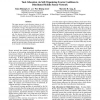Free Online Productivity Tools
i2Speak
i2Symbol
i2OCR
iTex2Img
iWeb2Print
iWeb2Shot
i2Type
iPdf2Split
iPdf2Merge
i2Bopomofo
i2Arabic
i2Style
i2Image
i2PDF
iLatex2Rtf
Sci2ools
144
click to vote
AAAI
2004
2004
Task Allocation via Self-Organizing Swarm Coalitions in Distributed Mobile Sensor Network
This paper presents a task allocation scheme via selforganizing swarm coalitions for distributed mobile sensor network coverage. Our approach uses the concepts of ant behavior to self-regulate the regional distributions of sensors in proportion to that of the moving targets to be tracked in a non-stationary environment. As a result, the adverse effects of task interference between robots are minimized and sensor network coverage is improved. Quantitative comparisons with other tracking strategies such as static sensor placement, potential fields, and auction-based negotiation show that our approach can provide better coverage and greater flexibility to respond to environmental changes.
AAAI 2004 | Intelligent Agents | Mobile Sensor Network | Sensor Network Coverage | Task Allocation Scheme |
| Added | 30 Oct 2010 |
| Updated | 30 Oct 2010 |
| Type | Conference |
| Year | 2004 |
| Where | AAAI |
| Authors | Kian Hsiang Low, Wee Kheng Leow, Marcelo H. Ang Jr. |
Comments (0)

